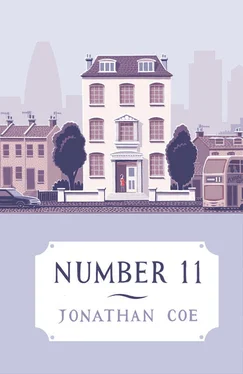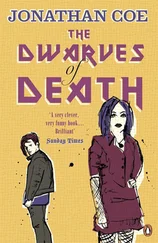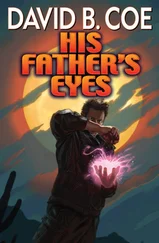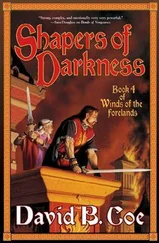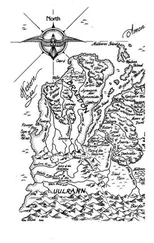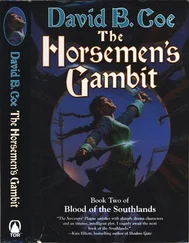‘Has he resigned, or something?’ she asked a pair of workers who were standing nearby.
‘Yep. He’s gone,’ said the first of them.
‘What was the argument about?’
‘He was drunk.’
‘Well, that’s what Tony says,’ his companion chipped in.
‘You saw the bottle. This morning it was full of vodka.’
‘Do you blame him? Imagine having to do what he’s been doing. Who would lead a crew on a job like this? It’s insane. It’s dangerous. This isn’t a building job, it’s a mining job. Why wouldn’t you start drinking?’
‘Fine, but if it means you start seeing things …’
‘Seeing things?’ repeated Rachel. ‘What sort of things?’
‘Dumitru told Tony that he wouldn’t go down into the pit again. He said he saw something bad, right down at the bottom.’ The man’s companion shook his head in warning, telling him to be quiet, but he continued anyway: ‘Apparently when you get down there, past all the other floors, down to Number 11, there’s a tunnel. They discovered it yesterday. No one had noticed it before. Dumitru went into it and crawled along for a while and saw —’
‘He didn’t see anything. The guy’s a drunkard. Always has been.’
‘What did he see?’ Rachel asked.
‘He doesn’t know what it was, exactly. He was flashing his torch ahead of him and then suddenly, right ahead of him, he saw a pair of eyes. Staring back at him. Staring out of the darkness.’
Rachel felt as if her heart had stopped beating. With an effort she said: ‘Was it a … cat, maybe? Perhaps a dog fell in or something and managed to —’
‘He said it was much bigger than that. Way bigger.’
The man fell silent. Whether he believed the story or not, it was clear that he had no appetite for the work they were now being asked to do at this house. Meanwhile, his companion said simply:
‘Dumitru saw nothing. He was drunk. There’s nothing down there. It’s a big hole in the ground, that’s all.’
Rachel was trapped, in effect. However much she hated being in the house at night, she couldn’t leave, because she had been entrusted with the care of the children.
What she really wanted to do was pack her things, take the train north and visit Grandad in the hospice again. By all accounts he was getting weaker and weaker and she hated the thought that she might not see him again before the cancer finally claimed him. But she couldn’t move. She had to stay where she was, to watch over them, to keep guard.One night, unable to sleep, she rose from her bed at about two o’clock and sat down at the little desk overlooking the garden. As always — as she did every few minutes, during her waking hours — she looked out into the dark to see if she could see any movement around the edges of the pit, but there was nothing. The workmen had tied the tarpaulin down even more securely than before.
Turning on her desklight, she took two objects out of the topmost drawer. One was the expensive, linen-covered notebook from Venice that Lucas had bought her, as a thank-you for her help with his Oxford interview. The other was the Pelmanism card that Phoebe had given her in the summer of 2003: the drawing of a lurid giant spider that so mysteriously resembled the work of Josep Baqué. She stared at the picture for a few minutes, as she had stared at it so often, so wonderingly and so uneasily, during the last ten years. Then she opened the notebook and began to write.
*
The paradox is this: I have to assume, for the sake of my sanity, that I am going mad.
Because what’s the alternative? The alternative is to believe that the thing I saw the other night was real. And if I allowed myself to believe that, surely the horror of it would also make me lose my mind. In other words, I’m trapped. Trapped between two choices, two paths, both of which lead to insanity.
It’s the quiet. The silence, and the emptiness. That’s what has brought me to this point. I never would have imagined that, in the very midst of a city as big as this, there could be a house enfolded in such silence. For weeks, of course, I’ve been having to put up with the sound of the men working outside, underground, digging, digging, digging. But that has almost finished now, and at night, after they have gone home, the silence descends. And that’s when my imagination takes over (it is only my imagination, I have to cling to that thought), and in the darkness and the silence, I’m starting to think that I can hear things: other noises. Scratches, rustles. Movements in the bowels of the earth. As for what I saw the other night, it was a fleeting apparition, just a few seconds, some disturbance of the deep shadows at the very back of the garden, and then a clearer vision of the thing itself, the creature , but it cannot have been real. This vision cannot have been anything but a memory, come back to haunt me, and that’s why I’ve decided to revisit that memory now, to see what I can learn from it, to understand the message that it holds.
Also, I’m taking up my pen for another good reason, quite an ordinary reason, and that’s because I’m bored, and it is this boredom — surely, this boredom and nothing else — that has been driving me crazy, provoking these silly delusions. I need a task, an occupation (of course, I thought I would find that by working for this family, but it has been a strange job so far, quite different from my expectations). And I’ve decided that this task will be to write something. I’ve not tried to write anything serious since my first year at Oxford, even though Laura, just before she left, told me that I should carry on with my writing, that she liked it, that she thought I had talent. Which meant so much, coming from her. It meant everything.
Laura told me, as well, that it was very important to be organized when you write. That you should start at the beginning and tell everything in sequence. Just as she did, I suppose, when she told me the story of her husband and the Crystal Garden. But so far, I don’t seem to be following her advice very well.
All right, then. I shall put an end to this rambling, and attempt to set down the story of my second visit to Beverley to stay with my grandparents, in the summer of 2003. A visit I made not with my brother this time but with Alison, my dear friend Alison, who at last after so many years’ mysterious distance I have found again, picking up the threads of our precious friendship. This is our story, really, the story of how we first became close, before strange — not to say ridiculous — forces intervened and drove us apart. And it’s also the story of –
But no, I mustn’t say too much just yet. Let’s go back to the very beginning.
*
Rachel stayed up most of that night writing the first few sections of her memoir. She felt tired in the morning, but also strangely refreshed and energized. After giving the girls breakfast and walking with them to school, she lay down for a short nap and then started working again. She wrote throughout the day, without interruptions. Outside, all was quiet. There was no sign of Mr Blake or the Romanian crew: she imagined that work had been suspended until a new site manager had been appointed. At three thirty, she picked the girls up from school again, and for the rest of the evening, again, she didn’t give them any extra lessons or ask them to do any homework. This time, being more practised at it, she was able to get them into bed more quickly and with less fuss. By nine o’clock she was at her desk once again. Looking back across the years, remembering the youthful friendship between Alison and herself, picturing the Beverley Westwood in summer sunshine, trying to evoke the love between her grandparents when they were both still in good health, she managed to escape the feeling of dread which she knew would otherwise envelope her if she had nothing to concentrate upon except the stillness of this house and the shapeless terrors which haunted its ruined garden.
Читать дальше
